Combermere School, West Indies' talent factory, takes pride in shaping not only fine cricketers but students of the game
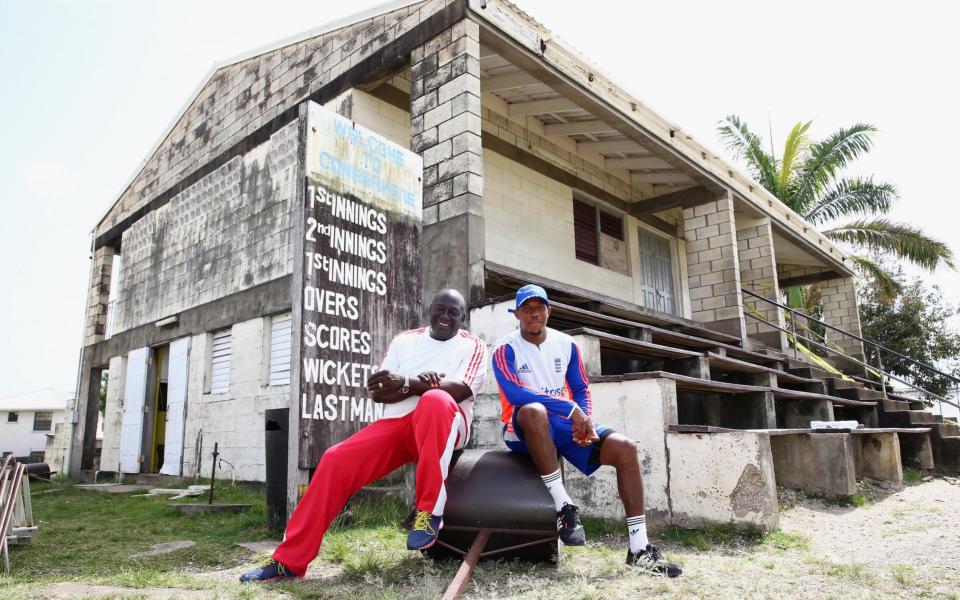
Standing on the edge of the Sir Frank Worrell Cricket Field, Combermere School principal Vincent Fergusson stops a young man wearing a prefect’s badge and asks him a simple question.
“Tell us what the school teaches you about cricket.” In a few words the prefect sums up an ideology that is shaping a revival of the West Indies that can trace a large part of its origins back to this school.
“That we are standing on the shoulders of giants, sir, that Sir Frank Worrell was the first black man to captain West Indies,” says the young man who is introduced as Shiane Brathwaite, a name we should remember says Mr Fergusson who believes he will be the next Combermere old boy to play for the West Indies (built like Shannon Gabriel, he opens the batting, rather than bowls fast).
It is Tuesday afternoon this week and West Indies are 2-0 up in the series.
Mr Fergusson is proudly showing off the school that produced three of the West Indies team that will play against England in the third Test on Saturday including Kraigg Brathwaite, who will captain the side in place of Jason Holder, and heroes of the first Test in Barbados, Roston Chase, who stunned England with eight for 60, and Shane Dowrich who scored a patient hundred.
Carlos Brathwaite, who launched Ben Stokes for four sixes to make West Indies current World Twenty20 champions, is a former pupil and remembered for hitting the ball out of the Sir Frank Worrell Cricket Field as a boy.

Jomel Warrican, the spare spinner in the current Test squad, also went to Combermere, as did England’s Chris Jordan and, most famously of all, the pop star Rihanna (who reportedly saved Kraigg Brathwaite from school bullies).
The principal’s office includes a yellowing photo of the England touring team of 1990 that included another old boy, Gladstone Small, and to reach the school off the main highway you turn at the Sir Clyde Walcott Roundabout, named after, yep, another Combermere old boy.
There is a photo of Rihanna in the school trophy cabinet underneath a bust of Worrell, who studied at Combermere in the 1940s. Both are surrounded by trophies, many won by the school’s outstanding cricketers down the years including another West Indies legend, Wes Hall.
Students have to pass the equivalent of the 11 plus to study at Combermere, the oldest secondary school in Barbados, and Mr Fergusson remembers Kraigg Brathwaite as the most earnest student and a batsman who has barely changed; Chase the one with the most natural cricketing ability and Dowrich mature beyond his years.
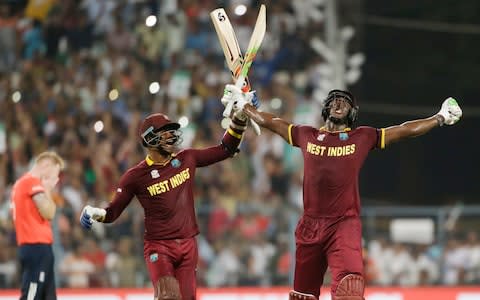
“I knew them as little boys. Kraigg Brathwaite was always a very stodgy batsman. A flick here, a flick there,” said Mr Fergusson, who has a small statue of Worrell batting on his desk inscribed Emulate to Stimulate.
“Roston could bat, bowl and field well. He was such a graceful player. I am talking about a boy of 15 or 16 who could use his feet well, avoid short pitched bowling, hit through the covers, hit right back over mid-off, mid-on. Good batsman. He had the height to be a spinner, he would toss the ball a lot. He was very much an orthodox bowler.
“Dowrich is the youngest of the three. He has matured a lot as a batsman.
“Kraigg’s father would be at every game. Roston’s father and mother too and Dowrich’s parents also would be there to give them that support. That helped them a lot. That discipline kept them on the straight and narrow.”
The school coach for 15 years was Roddy Estwick, who left to become West Indies bowling coach in 2015 and now works with the women’s team. He believes the school has produced at least 15 first-class cricketers in the past decade alone. “You wonder if any school in the world can boast such an achievement,” he says.
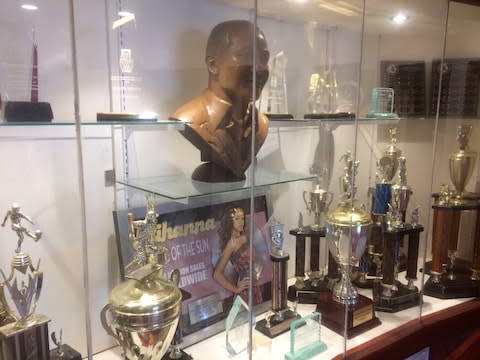
“We were very big on the history of the school and we made cricket a subject. Even if it rained we would head to the classroom and study cricket related things so they were brought up on the game, would know the laws, understand the history and how it fitted into the culture of the school and the Caribbean. It was very important to us. We were not just turning out cricketers, we were turning out students of the game. If you don’t know where you are going or where you came from how are you going to get where you want to be? Those things were very important to us both on and off the field.
“The crop with Dowrich, Chase, Warrican and Kraigg Brathwaite I remember from under-13s right through to the senior year. In any school if you have four talented boys you are going to win many trophies but what I liked about them was they were very hard working and had a major love for the game. All I tried to instil in them was discipline, to be punctual, to be hard working, not to take the game for granted. Just to respect the game because players with that kind of ability at a young age can tend to take things easy and not respect the game as they should.”
The Bajan influence courses through this West Indies team. Shai Hope and Holder went to different schools but grew up in age groups with the Combermere boys.
Kraigg Brathwaite (none of the Brathwaites are related) stood out according to Estwick because as a young boy he was unusually focused on his goals and showed early on the leadership skills that have made him Holder’s vice-captain.
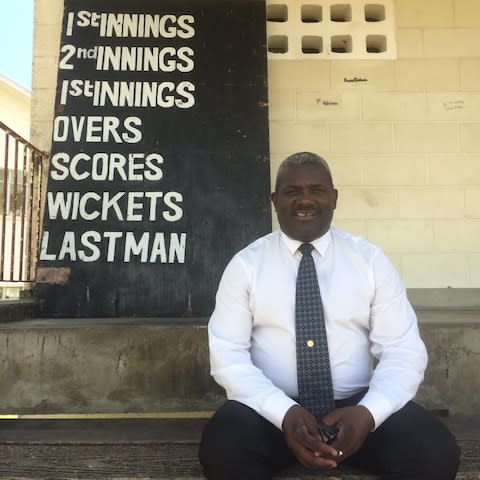
“From an early age you could see Shane and Roston were the more naturally talented of the four but Jomel and Kraigg were the hardworking ones. Jomel just liked cricket. You would get complaints to the classroom that Jomel was more in love with his bat than his schoolwork but Kraigg was always very hardworking at cricket and schoolwork.
“I remember Kraigg doing an interview at the age of 15 with a paper in Barbados before a cup final in which he was asked if he wanted to play Test cricket. He said he wanted to play 100 Test matches for the West Indies.
“Normally a boy his age will say he just wants to play Test cricket but Kraigg was sure that he wanted to play 100 Test matches. I thought it really strange but also pleasing that a boy his age could say he wanted to play 100 Tests not just one. It showed real ambition.”
Principal Fergusson worries that Kraigg is “too quiet” to be a successful captain but believes this generation are “a bit more intelligent and understand the importance of cricket to the West Indies,” so thinks they can spearhead a revival of West Indies cricket over the long term. He agrees there seems to be an ideology to revive the great days of Caribbean cricket that unites them.
It is currently the off season so the cricket field was brown and a little overgrown this week and given over to track and field.
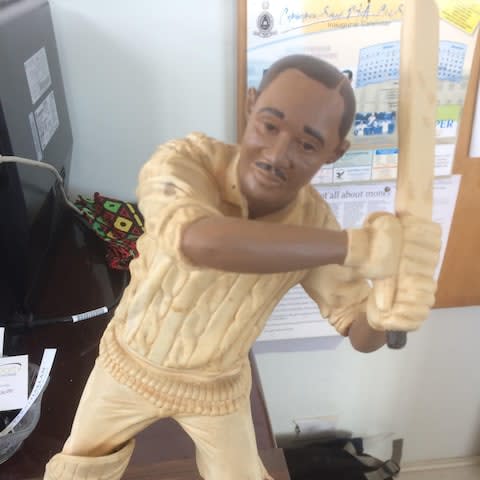
But given the talent pity the teachers who, when the new season starts, will play in the annual Masters v Students match. The Old Scholars versus Students game, played every October, is a knockabout game. It can feature Test match experience rather than ageing middle aged men with stiff backs.
“When you see Roston remind him of the Masters versus Students match when I got him out,” said Mr Fergusson. “I could see he was leaning over, and because he is a tall chap I bowled it in the blockhole. He spooned it in the air. Roddy took the catch.”
The final question to Mr Fergusson is to ask him for a story about Kraigg that might embarrass an old boy about to captain the West Indies. He laughs as he says: “He was an amorous guy. He had a girlfriend early. He was a lovely guy. We are very proud of him. A very, very steady guy.”

